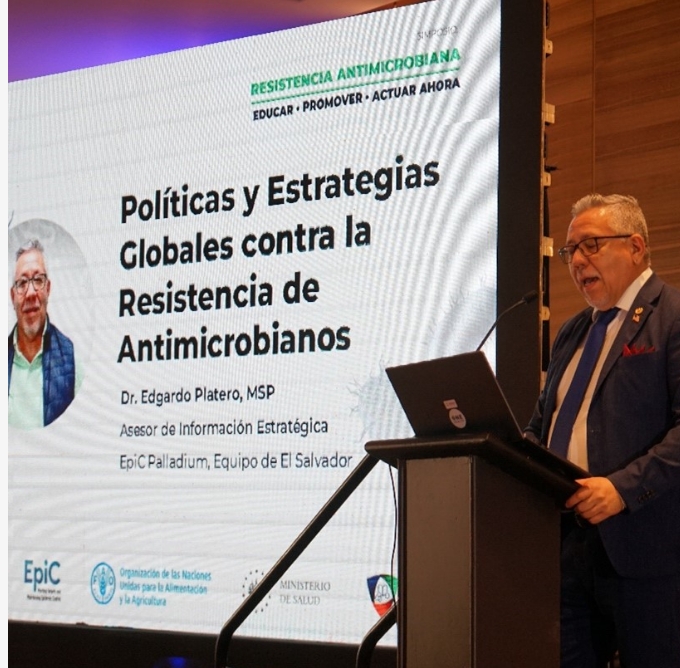Stephanie Mork, Palladium
This blog was originally posted on The Palladium Group’s website: Hidden Threats: Tackling Antimicrobial Resistance in El Salvador.
Imagine you are in a hospital, recovering from surgery, when you develop an infection. The doctors tell you the infection doesn’t respond to the antibiotics they are treating you with. They tell you they will need to try several different types of antibiotics until they find one that works.
Unbeknownst to you, there’s a chance that none of the antibiotics currently available will defeat the infection.
This is the very real danger of antimicrobial resistance (AMR): when bacteria, viruses, fungi or parasites become resistant and no longer respond to antimicrobial medicine, like antibiotics, resulting in further complications from the spread of disease and increase the risk of severe illness, and even death.
Globally, AMR contributes to nearly 5 million deaths each year.
While antibiotics are critical to treat infections, misuse and overuse of antibiotics are the main causes of AMR. During common medical procedures like surgery or other life-saving procedures, AMR can be life threatening.
Ultimately, the most effective way to reduce the risk of AMR in health facilities is to improve hygiene to prevent health care associated infections from happening in the first place. Monitoring the use of antibiotics in both humans and animals is another important measure to prevent the level of antimicrobial resistance from getting worse.
In Latin America, health facilities are often underfunded and don’t always have the infrastructure or resources to track AMR, antibiotic use, or practice handwashing. Many countries don’t have federal regulations or policies to guide health facilities with the appropriate mitigation measures, and if they do have policies in place, they are often incomplete—leaving out key stakeholders and best practices. Among 35 countries in the Americas region, antimicrobial resistance is estimated to have been associated with 569,000 deaths in 2019.
In El Salvador, Palladium is a member of the consortium implementing the Meeting Targets and Maintaining Epidemic Control (EpiC) Project, where Palladium has been a key partner to the Government of El Salvador to design policies and coordinate mechanisms to improve awareness of AMR among health personnel and develop stronger and comprehensive guidelines and policies for health workers to reduce the risk of AMR.
“When health workers understand the risks and impact of AMR, they can make more informed decisions for the prudent use of antimicrobials, avoiding unnecessary prescriptions, and promoting infection control practices,” explains Dr. Edgardo Platero, a Palladium technical advisor for EpiC in El Salvador, weighing in on the importance of improving awareness for AMR among health workers.
EpiC El Salvador has been working with the National Committee for Infection Prevention and Control and the Ministry of Health to develop an AMR awareness and social behavior change campaign for health personnel in hospitals with a strong focus on hand hygiene. This campaign included the display and distribution of AMR related materials, like graphics and posters, in health facilities. As of September 2024, these materials are displayed in 43 hospitals across El Salvador.
The campaign materials included graphics and messages that sought to increase awareness around AMR, including:
• “How to combat antimicrobial resistance? By complying with proper prescription guidelines for antibiotics including dosage, timelines, number of days of treatment indicated by the doctor.”
• “Never share your medications with relatives or friends. Remember that each body is different, and patients respond differently.”
• “When antibiotics are used in excess, antimicrobial resistance increases and their effectiveness decreases.”
• “Wash your hands, avoid infections.”
In El Salvador, the Ministry of Health has a National Action Plan Against Antimicrobial Resistance for 2022-2024. While there are several positive aspects of this plan such as the promotion of optimal use of antimicrobials and support for evidence-based surveillance and research, an analysis done by EpiC found that the plan is missing key information on the interconnected nature between animal health and human health.
Additionally, the plan lacks information on sustainable financing to carry out initiatives to address AMR and does not have a unified education and communications strategy to raise awareness and understanding of antimicrobial resistance.
To address these gaps and support the development of a more comprehensive One Health approach as part of the updated National Action Plan Against AMR for 2025-2030, EpiC is working closely with the Ministry of Health to revise the action plan and convene other key governmental entities in El Salvador including the Ministry of Agriculture and Livestock and the Ministry of Environment and Natural Resources, to take part in the planning and revision process of the next iteration of the National AMR Plan.
“AMR is a problem that extends beyond the health sector, as it is also affected by practices in the agriculture, animal health, and environmental health sectors,” explains Platero. “Engaging these sectors is key to adopting a One Health approach, which will allow the development of a more comprehensive and effective response and will help in the medium and long term to prevent the transmission of resistance throughout the ecosystem, protecting public health and the environment.”
In the next year, EpiC plans to partner with the Ministry of Health to provide technical support to update the National AMR Plan for 2025-2030 to include a broader One Health approach, and revise training materials for health workers on infection prevention and control and optimal use of antibiotics.
Now, imagine yourself back at the hospital, only without an infection at all. Your recovery is smooth, and you go home on schedule to live the rest of your life to the fullest. This is the power of infection prevention, and why these initiatives are so important—especially in resource poor settings.
Featured image: Dr. Edgardo Platero, Palladium technical advisor for EpiC in El Salvador, presenting on policies and strategies to address antimicrobial resistance at an event co-hosted by USAID, EpiC, the El Salvador Ministry of Health, and the Food and Agriculture Organization (FAO). Credit: Suyapa Gómez, Courtesy of FAO.

